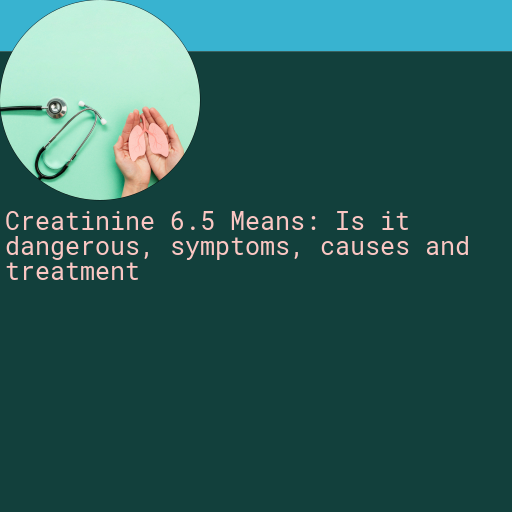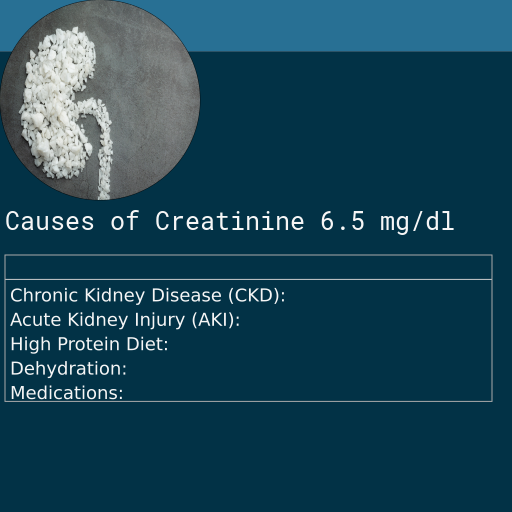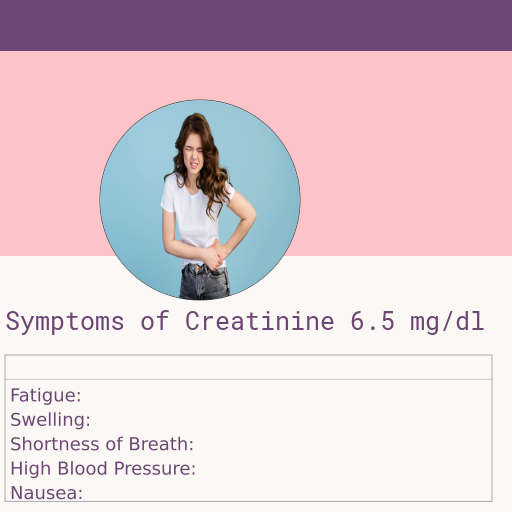Creatinine 6.5 : Is it Dangerous, Causes, Symptoms and More
Creatinine, a waste product found in the blood, is a crucial indicator of kidney function. When the level of creatinine in the blood rises to 6.5 mg/dL, it can signal serious health issues. Elevated creatinine levels are often linked to kidney disease or kidney failure, making it essential to understand the underlying causes and symptoms. Common causes include chronic conditions like diabetes and high blood pressure, as well as acute issues such as dehydration and urinary tract obstructions. Symptoms to watch for may include fatigue, swelling, and changes in urination. Early detection and treatment are paramount in managing creatinine levels and maintaining kidney health.

What is Creatinine
Creatinine is a byproduct of protein breakdown, specifically from muscle metabolism, and is considered a waste product with no use in the body. It is filtered out of the blood by the kidneys and excreted in urine. Elevated levels of creatinine in the blood can indicate that the kidneys are not functioning properly, as they are unable to efficiently remove this waste product. Monitoring creatinine levels is therefore crucial in assessing kidney health and diagnosing potential kidney-related issues.
- Muscle Metabolism: Creatinine is primarily produced from the normal wear and tear of muscle tissue.
- Dietary Intake: Consuming meats and other animal products can contribute to creatinine levels, as these foods contain creatine, which breaks down into creatinine.
- Supplements: Taking creatine supplements can increase creatinine levels in the body.
- Kidney Function: The kidneys filter creatinine from the blood; thus, impaired kidney function can lead to elevated creatinine levels.
- Medications: Certain medications, such as nonsteroidal anti-inflammatory drugs (NSAIDs) and certain antibiotics, can affect how the body processes creatinine.
- Dehydration: Lack of sufficient fluids can concentrate creatinine in the blood.
- High-Intensity Exercise: Engaging in rigorous physical activities can temporarily raise creatinine levels due to increased muscle breakdown.
Normal Range of Creatinine in Adults
In the realm of health metrics, it's essential to understand the normal range of creatinine levels in adults to gauge kidney function accurately. Typically, for men, the normal range falls between 0.6 to 1.2 milligrams per deciliter (mg/dL), while for women, it generally ranges from 0.5 to 1.1 mg/dL. These variations are attributed to differences in muscle mass, which influences creatinine production. Keeping your creatinine levels within these ranges is pivotal for maintaining optimal kidney health and function.
| Age Group | Normal Creatinine Range (mg/dL) |
|---|---|
| 0 - 1 year | 0.2 - 0.4 |
| 1 - 3 years | 0.3 - 0.7 |
| 3 - 5 years | 0.4 - 0.8 |
| 5 - 10 years | 0.5 - 0.9 |
| 10 - 15 years | 0.5 - 1.0 |
| 15 - 18 years | 0.5 - 1.1 |
| Adults (Male) | 0.6 - 1.2 |
| Adults (Female) | 0.5 - 1.1 |
| Elderly (Male) | 0.6 - 1.2 |
| Elderly (Female) | 0.5 - 1.2 |
Causes of Creatinine 6.5
Elevated creatinine levels can be a significant health concern, often pointing to underlying issues with kidney function. Creatinine is a waste product generated from muscle metabolism and is typically filtered out of the blood by the kidneys. When the kidneys are not working properly, creatinine can accumulate in the bloodstream. Common causes of elevated creatinine include chronic kidney disease, acute kidney injury, dehydration, and certain medications. Understanding these causes is crucial for timely diagnosis and effective treatment, ensuring better health outcomes for affected individuals.
- Chronic Kidney Disease (CKD): A progressive loss of kidney function over time, leading to elevated creatinine levels.
- Acute Kidney Injury (AKI): A sudden decline in kidney function, often due to severe dehydration, infection, or a toxic reaction to medication.
- High Protein Diet: Consuming a diet rich in protein can temporarily increase creatinine levels as the body breaks down protein into creatinine.
- Dehydration: Lack of sufficient fluids can reduce blood flow to the kidneys, causing creatinine levels to rise.
- Medications: Certain drugs, such as nonsteroidal anti-inflammatory drugs (NSAIDs) and some antibiotics, can affect kidney function and elevate creatinine.
- Diabetes: Poorly managed diabetes can lead to kidney damage, thereby increasing creatinine levels.
- High Blood Pressure: Hypertension can damage blood vessels in the kidneys, leading to impaired kidney function and elevated creatinine levels.
- Urinary Tract Obstruction: Conditions like kidney stones or an enlarged prostate can block the urinary tract, causing a rise in creatinine levels.

Symptoms of Creatinine 6.5
When it comes to identifying elevated creatinine levels, recognizing the symptoms is crucial. High creatinine levels can be a sign of impaired kidney function, and the symptoms often include fatigue, swelling in the lower extremities, shortness of breath, and changes in urination patterns. These indicators can vary in severity and may be accompanied by other signs of underlying health issues. Understanding these symptoms is essential for seeking timely medical intervention and preventing further complications.
- Fatigue: Feeling unusually tired or weak due to decreased kidney function.
- Swelling: Edema in the hands, feet, or face resulting from fluid retention.
- Shortness of Breath: Difficulty breathing as lungs fill with excess fluid.
- High Blood Pressure: Elevated blood pressure levels due to impaired kidney filtration.
- Nausea: Feeling queasy or experiencing an upset stomach.
- Confusion: Mental fog or difficulty concentrating, often due to toxin buildup.
- Urine Changes: Alterations in urine frequency, color, or presence of foam.
- Chest Pain: Discomfort in the chest area, which may indicate fluid overload or other complications.

Dangers of Creatinine 6.5
Elevated levels of creatinine in the blood can be a cause for concern as it often indicates underlying health issues, particularly related to the kidneys. While creatinine itself does not directly harm the body, its increased presence is a strong signal that the kidneys may not be functioning properly. This can be a sign of kidney failure or other significant medical conditions. In such situations, other waste products, such as urea, may also accumulate in the body, leading to potentially harmful effects and posing serious health risks. It is crucial to address and investigate elevated creatinine levels to prevent further complications and ensure proper kidney function.
- Kidneys: Elevated creatinine levels can indicate kidney dysfunction, potentially leading to kidney failure if untreated.
- Heart: High creatinine levels can contribute to cardiovascular issues, such as hypertension and heart disease.
- Liver: Elevated creatinine may signal liver damage or impaired liver function, as the liver plays a role in managing waste products.
- Muscles: High creatinine often correlates with muscle damage or disorders, as creatinine is a byproduct of muscle metabolism.
- Brain: Increased creatinine can affect the brain, leading to neurological symptoms such as confusion and cognitive impairment.
- Gastrointestinal System: Elevated levels can cause digestive issues, including nausea and vomiting.
- Lungs: High creatinine may be linked to respiratory problems, making breathing more difficult.
- Immune System: Elevated levels can compromise the immune response, increasing the risk of infections.
Home remedies for Creatinine 6.5
Disclaimer: Elevated creatinine levels, such as a creatinine of 6.5, indicate a potentially serious kidney issue that cannot be treated at home. It is crucial to seek immediate medical attention from healthcare professionals. Basic supportive care may include ensuring adequate hydration, following a kidney-friendly diet, and avoiding medications or substances that can further harm the kidneys. However, these measures are only supportive and not a substitute for professional medical treatment. Always consult with a healthcare provider for an accurate diagnosis and appropriate treatment plan.
- Stay Hydrated: Ensuring adequate fluid intake can help your kidneys function properly. Drink plenty of water throughout the day, but be cautious if you have been advised to limit fluids.
- Follow a Kidney-Friendly Diet: Reduce the intake of potassium, phosphorus, and sodium. Focus on eating fresh fruits and vegetables, but consult with a healthcare provider for specific dietary recommendations.
- Monitor Blood Pressure: Keeping your blood pressure in check can reduce the strain on your kidneys. Use a home blood pressure monitor and follow your doctor's advice on managing hypertension.
- Limit Protein Intake: Too much protein can make your kidneys work harder. Opt for smaller portions of high-quality proteins like fish, poultry, and eggs, and consider plant-based protein sources.
- Avoid Over-the-Counter Pain Relievers: Non-prescription medications like ibuprofen and naproxen can harm kidney function. Use them sparingly or seek alternatives as recommended by your healthcare provider.
Treatment for Creatinine 6.5
When a creatinine level of 6.5 is detected, immediate medical treatment by a doctor is essential. The primary treatment goals include stabilizing kidney function, which may involve medications or procedures to support the kidneys. Additionally, doctors will focus on stopping harmful drugs that could be exacerbating the condition, ensuring that any nephrotoxic medications are discontinued. Another critical aspect of treatment is treating infections, as infections can significantly worsen kidney function. By addressing these key areas, medical professionals aim to improve the patient's overall kidney health and prevent further complications.
- Medication Adjustment: Doctors may adjust or prescribe medications to help manage the underlying conditions affecting kidney function and reduce creatinine levels.
- Dietary Changes: Implementing a kidney-friendly diet, which includes low protein, low potassium, and low phosphorus foods, can help manage creatinine levels.
- Hydration: Ensuring proper hydration is crucial. Drinking enough water can support kidney function and help in the excretion of creatinine.
- Treating Underlying Conditions: Managing diabetes, high blood pressure, or other health issues effectively can help improve kidney function and lower creatinine levels.
- Dialysis: In severe cases, dialysis may be required to remove waste products from the blood, including creatinine, when the kidneys are not functioning adequately.
GFR with Creatinine of 6.5
The Glomerular Filtration Rate (GFR) is a crucial measure in evaluating kidney function, as it estimates how well your kidneys are filtering waste from your blood. While a specific creatinine level, such as 6.5, can indicate kidney issues, it is the GFR that provides a more comprehensive understanding of your kidney health. This is because GFR takes into account various factors like age, sex, and body size, offering a personalized measure of kidney performance. Therefore, relying solely on the absolute value of creatinine can be misleading, as it doesn't provide a full picture of kidney function. Monitoring GFR is essential for a more accurate assessment and management of kidney health.
| Grade | GFR (mL/min/1.73 m²) | Description | Implications |
|---|---|---|---|
| G1 | ≥ 90 | Normal or High | Kidney function is normal, no signs of kidney disease. |
| G2 | 60-89 | Mildly Decreased | Mild reduction in kidney function, usually without symptoms. |
| G3a | 45-59 | Mildly to Moderately Decreased | Early signs of kidney disease, monitor kidney function. |
| G3b | 30-44 | Moderately to Severely Decreased | More advanced kidney disease, increased risk of complications. |
| G4 | 15-29 | Severely Decreased | Severe impairment, requires close monitoring and management. |
| G5 | < 15 | Kidney Failure | End-stage kidney disease, dialysis or transplant often needed. |
What is my GFR for a creatinine of 6.5
| Age | Gender | GFR |
|---|---|---|
| 18 | male | 11.22 ml/m2 |
| 45 | male | 9.32 ml/m2 |
| 60 | male | 8.79 ml/m2 |
| 80 | male | 8.29 ml/m2 |
| 18 | female | 8.33 ml/m2 |
| 45 | female | 6.91 ml/m2 |
| 60 | female | 6.52 ml/m2 |
| 80 | female | 6.15 ml/m2 |
Table of danger posed by Creatinine 6.5 in male across different ages
| Age Group | Is Creatinne of 6.5 dangerous? |
|---|---|
| 25yrs - 95 yrs | very dangerous, Get immediate medical advice and treatment. |
Table of danger posed by Creatinine 6.5 in female across different ages
| Age Group | Is Creatinne of 6.5 dangerous? |
|---|---|
| 25yrs - 95 yrs | very dangerous, Get immediate medical advice and treatment. |

Which other tests should be done for a creatinine value of 6.5?
When dealing with elevated creatinine levels, it's essential to understand the comprehensive nature of kidney function and overall health. In addition to monitoring creatinine, healthcare providers often recommend other tests to get a fuller picture. These include electrolytes, which help evaluate the balance of minerals in the body, and the renal profile, which examines various aspects of kidney function. Furthermore, blood gas levels can be crucial, particularly in assessing the body's acid-base balance and oxygenation status. Together, these tests offer a more detailed understanding of your health and assist in devising an effective treatment plan.
- Electrolytes: This test measures the levels of essential minerals in the blood, such as sodium, potassium, calcium, and chloride. It helps in evaluating kidney function and detecting imbalances that could affect heart and muscle function.
- Renal Profile: A comprehensive test that includes measurements of blood urea nitrogen (BUN), serum creatinine, and estimated glomerular filtration rate (eGFR). It provides a detailed picture of kidney health and function.
- Blood Gas Levels: This test measures the amount of oxygen and carbon dioxide in the blood, as well as the blood's pH level. It is crucial for assessing respiratory function and the acid-base balance in the body, which can be affected by kidney disease.
- HbA1c: Also known as hemoglobin A1c, this test measures the average blood sugar levels over the past three months. It is particularly useful for diagnosing and monitoring diabetes, which can be a contributing factor to kidney disease.
- LDH: Lactate dehydrogenase (LDH) is an enzyme found in almost all body tissues. Elevated levels can indicate tissue damage and are often used to monitor conditions such as hemolysis, heart failure, and kidney disease.
- Urea: Also known as blood urea nitrogen (BUN), this test measures the amount of nitrogen in the blood that comes from the waste product urea. It helps evaluate kidney function and the body's metabolic processes.
- Liver Enzymes: Tests like ALT (alanine aminotransferase) and AST (aspartate aminotransferase) measure liver function. Abnormal levels can indicate liver disease, which can be related to or exacerbate kidney issues.

 By: Dr.Bhargav Raut
By: Dr.Bhargav Raut